Fort Lauderdale-Hollywood Int’l Regains Lost Parking Revenue
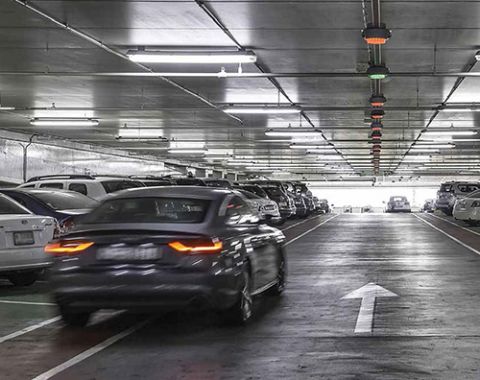
In 2009, parking operations at Fort Lauderdale-Hollywood International Airport (FLL) were basically on life support. With volume and revenue sliding at alarming rates, the executive team drafted Doug Wolfe, FLL's chief financial officer, to revive the ailing profit center.
"Our customers were abandoning us and we were losing parking revenue," recalls Wolfe. "The off-airport parking businesses grew from 2% to 12% of market share. Something had to be done."
Wolfe consequently assembled a team and launched a multi-disciplined plan to fix the problems. He describes the approach as "Business 101."
With new equipment and service policies in place, parking revenues at the southeastern Florida airport now exceed previous levels-and additional programs such as tiered pricing and new loyalty incentives are still to come.
|
|
3 Major Challenges
The team began by engaging Mars Research to determine what was alienating passengers flying out of FLL. Results highlighted three main issues: the physical condition of facilities, customer service and technology.
 FLL's physical shortcomings were evident to researchers. Signage, for instance, was confusing and made it difficult for customers to find the proper garage and navigate through it. Often, they would get lost trying to exit, Wolfe relates.
FLL's physical shortcomings were evident to researchers. Signage, for instance, was confusing and made it difficult for customers to find the proper garage and navigate through it. Often, they would get lost trying to exit, Wolfe relates.
"Without a guidance system, our customers circled around and were spending so much time trying to find a space that they were missing flights," he recalls. "That is a huge failing on our part, because the last thing passengers want to do is spend their time looking for a place to park. You can imagine what it's like to be a passenger in a huge garage when you can't find a spot; it's stressful."
Guests also expressed safety concerns about dim lighting. "Security was one of the attributes that came through loud and clear," Wolfe remarks. "Security is a high priority for our customers."
Walk-through inspections identified green mold growing on sidewalks, broken delineators and insufficient maintenance in FLL parking garages and surface lot.
"It was no wonder our customers didn't have a good impression," reflects Wolfe. "If you go to a restaurant and it's dirty, you don't want to eat there. It was the same idea with our parking situation."
Inspired by customer feedback and market research, FLL literally cleaned up its act. Wolfe and his team took a hard look at the parking facilities and issued work orders for pressure washing, cleaning, painting and a variety of general repairs.
With the physical condition of parking facilities improving quickly, the team turned its attention to the second issue that the research firm identified: customer service.
"We had become complacent about customer service," Wolfe acknowledges. "We changed the parking management company and put an emphasis on taking care of our customers. Our customers deserved more than we were providing."
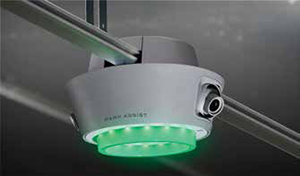
The new parking management company, SP+, devotes significant resources to customer service training, analyzing and responding to customer feedback, and monitoring customer service satisfaction levels, he reports.
Early meetings with the new management company were undoubtedly interesting, as FLL's customer service representatives were averaging 11 calls per day from customers who couldn't find their cars. That added up to about 4,000 calls annually, which tied up significant amounts of time and resources that could have been spent handling other issues.
 Lastly, FLL updated the technology in its parking facilities. During a due diligence review, Information Systems Manager Angela Scott carefully considered the options that would work best for the airport.
Lastly, FLL updated the technology in its parking facilities. During a due diligence review, Information Systems Manager Angela Scott carefully considered the options that would work best for the airport.
"It is important to show that we are up to speed regarding current technology," says Scott. "Tech is a huge part of parking, and not just the gates and ticket spitters. There is a huge component of tech that our customers want and need."
Implementing Change
According to Wolfe, it became apparent that FLL needed a guidance system. Previously, the airport was known as an easy-in, easy-out facility. But its strong reputation came under duress during a period of major passenger growth. Last year, the airport handled a record 26.9 million passengers.
After 11/2 years of in-depth conversation and research, FLL chose Park Assist to provide it with automated equipment to help guide customers to parking spots. The New York-based company designed and installed its camera-based system, with LED lights, cameras and digital signage in each aisle on every floor of FLL's two main garages.
"We have garages that range from four to nine levels, and on any given floor we might have 1,000 spaces," says Wolfe. "Passengers are anxious, and all they want to do is park and get to their gate. This seems intuitive, but it had escaped us. The guidance system solves that issue."
Now, passengers can see at a glance what is available to them-starting with digital signage before they arrive at the airport and the airport's new smartphone app that displays the number of parking spaces available on each floor in every garage.
"Passengers can identify which garage they want to park in before they even get to the airport," says Park Assist Chief Executive Officer Gary Neff. "That allows the customer to decide where they want to park or verify availability near their terminal."
Inside the garages, digital signs indicate how many spaces are open on a given level and the levels above. Along individual aisles, red lights signal occupied spaces; green lights indicate available spaces.
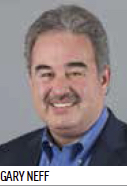
Although Park Assist has implemented camera-based parking systems at airports elsewhere in the world, FLL is its first project at a U.S. airport. The company also conducts significant business with shopping centers, which underscored its emphasis on customer service to Wolfe.
The airport opted for Park Assist's system that uses dual cameras installed above driving lanes for unobstructed views of parked vehicles and the spaces around them. Wolfe's team considers the camera system a key element in the success of the airport's Park Surveillance software extension, which offers expanded security that would otherwise be cost-prohibitive. Information that streams in from the camera-based system allows personnel to review turnover rates, determine the length of time specific vehicles have been parked, and identify vehicles that may be a threat.
According to Park Assist, FLL is the first U.S. airport to use a camera-based parking guidance system. "We use cameras integrated with a power processor as opposed to ultrasonic technology," explains Neff, noting that ultrasonic systems provide a simple yes/no response about whether a spot is occupied. "For the same money, or even less, we install a camera system with a brain over the aisle that can see four spaces and provide considerably more business intelligence than just a space being occupied."
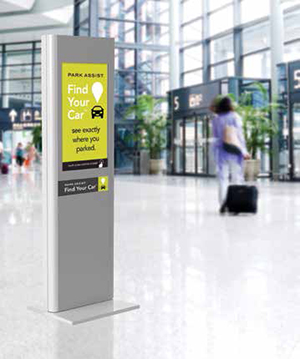
Cameras capture the license plate number of each vehicle that enters a garage and record the location where it parks. If customers forget where they parked, they can enter their partial license plate number or full ticket number into one of the 18 "Find Your Car" kiosk in FLL's terminals and garages. The system locates the lost vehicle and displays a photograph and map that details its exact location. A similar Find Your Car feature is also available on FLL's new app, which the airport created with a national mobile platform developer.
FLL awarded the project to Park Assist last summer, and the new system was implemented by the end of the year. Together, the airport and vendor created a plan to install the new guidance system for 6,000 spaces while keeping the garage fully operational. "We installed the entire system down the center of the aisle while business was running," recalls Neff. "We re-routed traffic but didn't shut anything down."
Currently, Park Assist is integrating its system with a web-based software system from UK-based HUB Parking Technology that controls all the parking services and technologies for managing FLL's parking facilities. Park Assist also provides the airport with real-time analytics and reporting and analyzes operational data.
Beginning in October, FLL's mobile app will allow passengers and other airport visitors to make parking reservations and redeem customer loyalty rewards on their smartphones.
The valet service introduced in November 2015 is already a big hit. "The first three months we offered valet on the curb, we logged 1,200 reservations and we hadn't even advertised the service at that point," reports Wolfe.
Harnessing the Analytics
With various fixes in place, parking revenue now exceeds previous levels; but Wolfe isn't ready to sit back and relax. "Parking is a consumer product," he emphasizes, noting that passengers can park offsite or arrange Uber or limousine rides instead of parking at the airport. "We need to understand how that's occurring and why," he adds. To do so, the team will initiate another round of market research to collect fresh data, which should provide a better understanding of how the airport is performing and how customers perceive it.
Another project in the works is tiered pricing. FLL plans to integrate Park Assist's Select-Rate software with its existing revenue control system to vary the price of parking rates-charging higher fees for premium spaces closest to the terminals, for instance. Much like the airline seating model, which allows passengers to choose premium seats for an additional cost, FLL's tiered parking will allow customers to select premium parking at a higher price. Data collected from ongoing operations will be used to develop the new system. Wolfe notes that Park Assist's analytics was one of the reasons FLL selected the company.
"We believe garages can provide a higher level of service by enabling customers to purchase parking when and where they want," says Neff. "This functionality will allow airports to charge regular or premium parking dynamically. We really believe in tiered pricing; it's going to catch on, and Fort Lauderdale is one of the first to do it."
"There is a huge appetite for reservations, and in the next 90 days we'll be able to introduce tiered parking and reservations via the website and our app," reports Wolfe. "We'll use the lighting system to identify nested areas available for advanced booking. In Europe, 80% to 90% of the spaces are reserved, and we're looking forward to rolling out that technology here."
FLL also plans to implement a new customer loyalty program with discounts for frequent parkers by October.
"In my opinion, a lot of airports in the U.S. look at their parking as a utility," reflects Wolfe. "If you ignore your parking, it affects the airlines, and that affects air service. Airport management's responsibility is to ensure that air service is at the appropriate level and cost is part of the equation. Airports need to pay attention to parking as a business."
2022 Charlotte Douglas International Airport Report of Achievement
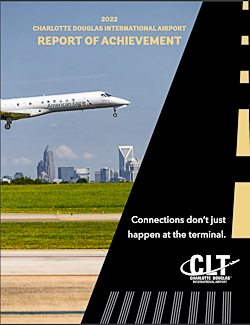 Giving back to the community is central to what Charlotte Douglas International Airport and its operator, the City of Charlotte Aviation Department, is about, and last year was no different.
Giving back to the community is central to what Charlotte Douglas International Airport and its operator, the City of Charlotte Aviation Department, is about, and last year was no different.
Throughout 2022, while recovering from the COVID-19 pandemic, we continued our efforts to have a positive impact on the Charlotte community. Of particular note, we spent the year sharing stories of how Connections Don't Just Happen at the Terminal - from creating homeownership and employment opportunities to supporting economic growth through small-business development and offering outreach programs to help residents understand the Airport better.
This whitepaper highlights the construction projects, initiatives, programs and events that validate Charlotte Douglas as a premier airport.
Download the whitepaper: 2022 Charlotte Douglas International Airport Report of Achievement.
 FACTS&FIGURES
FACTS&FIGURES







